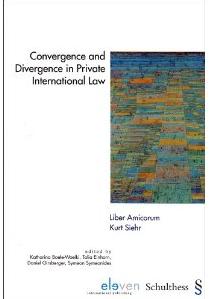The third issue of the Dutch journal on Private International Law, Nederlands Internationaal Privaatrecht is dedicated to the proposal for a new Dutch Act on Private International Law that will be incorporated in Book 10 of the Dutch Civil Code. It includes a critical general review, and contributions on private international law rules on marriages and the consequences for public policy and human rights; the regulation of overriding mandatory rules; the regulation of fait accompli; methods of interpretation in the light of Europeanization and internationalization; and party autonomy and the law of names.
- A.P.M.J. Vonken, Boek 10 BW: meer – incomplete – consolidatie dan codificatie van het Nederlandse internationaal privaatrecht. Een bekommernisvolle bespiegeling over een legislatieve IPR-surplace, p. 399-409. The English abstract reads:
In recent decades European private international law (PIL) has undoubtedly made progress. This is largely due to the fact that a number of legislators have either codified part or all of their national PIL rules or adopted treaties and regulations drawn up by, e.g., the Hague Conference on Private International Law and the European Union. Recently, the Dutch legislator has also introduced a codification or, more precisely, a ‘consolidation’ covering an incomplete set of topics on the field of choice of law. I will argue that this Dutch project should be amended and supplemented to include the areas of international civil procedure (e.g., jurisdiction and the recognition and enforcement of foreign judgments) and to cover a more complete ruling of all kinds of choice of law issues for the sake of legal practice. Finally, I will propose some amendments and refinements to specific rules contained in this consolidation project.
- Susan Rutten, Aanpassing van het huwelijksrecht; gevolgen voor de openbare orde en mensenrechten in het IPR, p. 410-420. The English abstract reads:
The Dutch government is considering to take on problems of integration caused by the immigration of spouses through amending the rules governing marriage. The objective is to prevent immigrants living in the Netherlands from marrying abroad merely for the purpose of enabling their new spouse to acquire legal residence in the Netherlands. With this in mind, the government intends to raise the minimum age for marrying; to prohibit the conclusion of marriages between cousins; and to tighten the rules governing the recognition of foreign polygamous marriages. The plans will also affect rules of private international marital law, as well as the use of the public policy exception. In this article, the author examines whether the government’s tentative proposals respect human rights, in particular the right to marry. Furthermore, she questions whether the public-policy exception is a suitable technique for warding off undesirable foreign marriages. The introduction and codification in the Dutch Civil Code of a new book on private international law provide an opportunity for the legislator to legally define the concept of public policy. An express reference could be made to the effect that human rights are part of our public policy, since human rights, because of their nature, are in any case seen as fundamental principles. The above proposals by the government also prompt us to be aware of the risk of public policy being used or abused for interests other than those for which the exception was intended, where it is invoked to safeguard rules of which it is less evident that they may be seen as fundamental.
- Cathalijne van der Plas, Het leerstuk van de voorrangsregels gecodificeerd in boek 10: werking(ssfeer), p. 421-429. The English abstract reads:
Draft book 10 of the Dutch Civil Code contains a general conflict of laws provision in Article 10:7 on super mandatory rules (lois de police). Many international instruments, in particular several Hague Conventions and the Rome I and II Regulations, provide for the application of such special rules of a mandatory nature in addition to, or in derogation from, applicable private law. It nevertheless makes sense for the Dutch legislature also to provide for a domestic conflict of laws rule on the application of super mandatory rules, because not all areas of private law have been covered (as yet) by international instruments: notably parts of family law and the law of succession, the law of property, and of corporations. Some aspects of the application of super mandatory rules which remain uncertain in connection with the Rome I and II Regulations have been made explicit by the legislature, in particular the principle that the application of a law pursuant to rules of PIL includes super mandatory rules of that lex causae. Article 10:7 also allows for the application of super mandatory rules of third countries, which goes beyond the room for the application of such rules under Article 9 of the Rome I Regulation. It is submitted that the test which a court must apply when deciding whether the application of foreign public or administrative rules of law is justified and bears a resemblance to the tests under EU case law for determining whether some national rule infringes the free circulation of assets, capital and persons. EU case law provides examples of compelling public interests which could justify the application of a super mandatory rule in a specific situation. However, the Dutch courts will have the freedom to decide on the tests to be applied, and it remains to be seen how the new Article 10:7 will work out in specific cases.
- M.H. ten Wolde, De mysteries van het fait accompli en Boek 10 BW, p. 430-436. The English abstract reads:
Article 9 of draft Book 10 of the Civil Code introduces a new fait accompli (an accomplished fact) exception to be used in every area of conflict of laws: ‘In the Netherlands, the same legal consequences may be attached to a fact to which legal consequences are attributed under the law which is applicable under the private international law of a foreign state, also when this contravenes the law which is applicable according to Dutch private international law, in as far as not attaching those consequences would constitute an unacceptable violation of the legitimate expectations of the parties or of legal certainty.’ This provision aims to adjust the result of applying a Dutch conflict of law rule in the event that such a result is unacceptable since the parties involved assumed that a foreign conflict rule that referred the case to a different law was in fact applicable. The question arises whether the consequences attributed to a fact or act according to a foreign conflict of law rule may be accepted, even if those consequences do not arise under the law which is applicable according to Dutch conflict of law rules. In such a case Dutch conflict rules should yield in favour of the foreign conflict rule, but subject to the condition that the parties rightfully believed that their legal position was determined by the closely connected foreign conflict rules in question. Moreover, not granting such effects has to constitute an unacceptable violation of the legitimate expectations of the parties or of legal certainty It is remarkable that the fait accompli exception is codified as an universal exception to all conflict rules since it has never been regarded as such in the case law or literature. Among scholars it is mainly seen as a concept that helps to discover the applicable law. The legislator bases the exception of Article 9 on the principle of legitimate expectations as expressed in the Sabah case decided by the Supreme Court and on legal certainty. However, in the Sabah case the court dealt with a completely different problem, namely that of Dutch conflict rules succeeding each other in time. The author argues that the mentioned principle cannot, without any good reason, be extended to the question of the conflict between Dutch conflict rules and foreign conflict rules. Besides this, there is no valid reason to protect parties who deliberately cross the border to a foreign country against their unfamiliarity with the law (including confict of law) of that country. The reality of international legal practice is that a legal position as a consequence of differing conflict rules may have a different content in one country than in another. Parties should be aware of this fact. International legal practice does not need a fait accompli exception. It is advisable to delete Article 9 from Book 10 Civil Code.
- A.E. Oderkerk, Een lappendeken van interpretatiemethoden in de context van het Ontwerp Boek 10 BW – De invloed van Europeanisering en internationalisering van het IPR, p. 437-446. The English abstract reads:
In the Dutch Proposal on Private International Law (Book 10 of the Dutch Civil Code), a ‘General Part’ containing provisions on topics like public policy, internationally mandatory provisions, party autonomy, capacity et cetera has been included. However, unlike in some foreign private international law Acts, general provisions on interpretation and/or characterisation have been deliberately omitted. In this article it is argued that it would have been useful and possible to introduce such provisions. Useful because different methods (of a general, European or international background) of interpretation and characterisation have to be applied to different (groups of) provisions of this Book and it will not be obvious to practitioners which method will have to be applied when and how. Possible since – as will be shown – guidelines on which methods of interpretation and characterisation are to be applied and in which context can be laid down.
- Emilie C. Maclaine Pont, Partijautonomie in het ‘nieuwe’ internationale namenrecht, p. 447-455. The English abstract reads:
Recently, a bill has been prepared by the Dutch legislature in order to consolidate the rules of Dutch private international law. This ‘Book 10 of the Dutch Civil Code’ includes personal status issues. More specifically, this article focuses on surnames. In two judgments – Garcia Avello and Grunkin-Paul – the Court of Justice of the EU provided incentives for the Member States to reconsider their rules regarding surnames concerning conflict of law rules and the recognition of surnames. The question is whether the Dutch regulations as laid down in the new ‘Book 10 of the Dutch Civil Code’ are in conformity with these decisions. This article reaches the conclusion that this question must be answered in the negative and recommends some adjustments to the current bill with the introduction of a choice of law clause.
 The 12th volume of the Yearbook of Private International Law (2010) will shortly be released.
The 12th volume of the Yearbook of Private International Law (2010) will shortly be released. The last issue of the Revue critique de droit international privé was just released. It contains three articles and several casenotes. The full table of contents can be found
The last issue of the Revue critique de droit international privé was just released. It contains three articles and several casenotes. The full table of contents can be found  The first issue of the
The first issue of the  Reports of the death of the 1968 Brussels Convention have been greatly exaggerated.
Reports of the death of the 1968 Brussels Convention have been greatly exaggerated.
 Mathias Audit
Mathias Audit